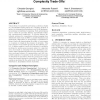Free Online Productivity Tools
i2Speak
i2Symbol
i2OCR
iTex2Img
iWeb2Print
iWeb2Shot
i2Type
iPdf2Split
iPdf2Merge
i2Bopomofo
i2Arabic
i2Style
i2Image
i2PDF
iLatex2Rtf
Sci2ools
BIRTHDAY
2003
Springer
2003
Springer
Distributed Cooperation and Adversity: Complexity Trade-Offs
The problem of cooperatively performing a collection of tasks in a decentralized setting where the computing medium is subject to adversarial perturbations is one of the fundamental problems in distributed computing. Such perturbations can be caused by processor failures, unpredictable delays, and communication breakdowns. To develop efficient distributed solutions for computation problems ranging from distributed search such as SETI to parallel simulation and multi-agent collaboration, it is important to understand efficiency trade-offs characterizing the ability of p processors to cooperate on t-tasks in the presence of adversity. This paper surveys recent results grouped by the following topics: (i) failure-sensitive bounds for distributed cooperation problems for synchronous processors subject to crash failures, (ii) bounds on redundant work for distributed cooperation when individual asynchronous processors may experience prolonged absence of communication, and (iii) competitiv...
Applied Computing | Asynchronous Processors | BIRTHDAY 2003 | Efficient Distributed Solutions | Individual Asynchronous Processors |
| Added | 06 Jul 2010 |
| Updated | 06 Jul 2010 |
| Type | Conference |
| Year | 2003 |
| Where | BIRTHDAY |
| Authors | Chryssis Georgiou, Alexander Russell, Alexander A. Shvartsman |
Comments (0)

